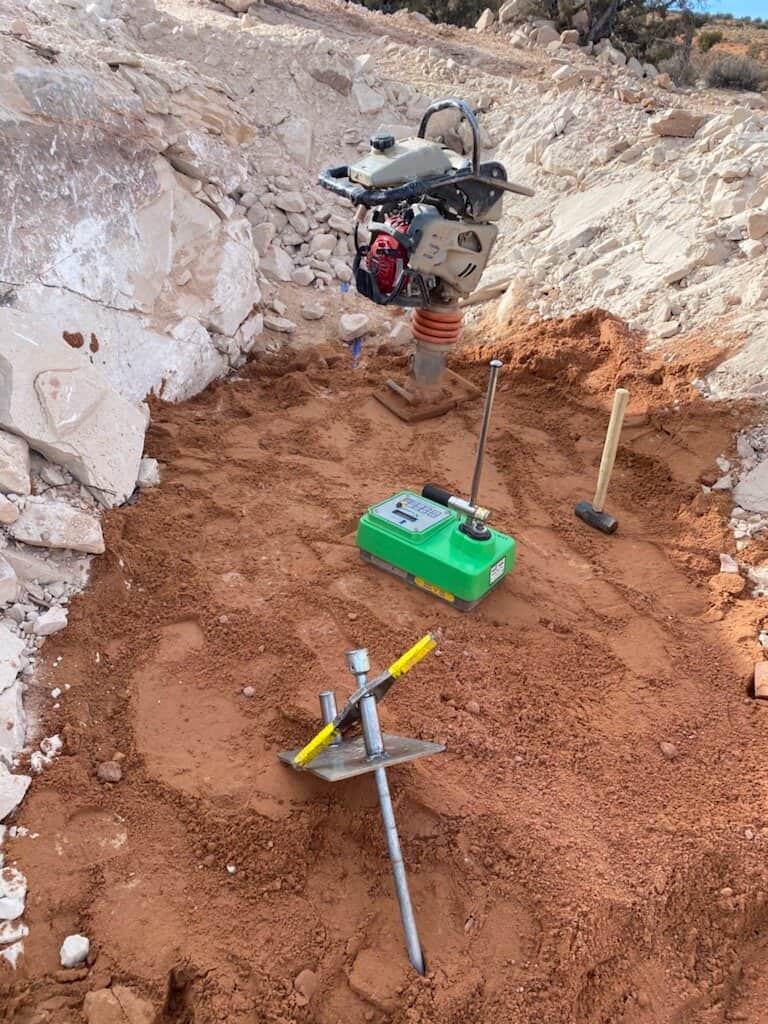For El Paso residents, cultivating thriving gardens and landscapes often requires extra effort. The region’s unique environment, characterized by desert landscapes and alkaline soil, presents challenges for plant growth. Many residents, eager to overcome these obstacles, might seek out “soil testing in El Paso” to gain insights into their land’s health and suitability for specific plants. However, it’s crucial to understand that the term “soil testing” in El Paso, particularly within a construction context, holds a distinct meaning compared to the soil analysis typically used for gardening purposes.
Unveiling the Hidden: Soil Testing in Construction
When encountering “soil testing” in El Paso in the context of construction projects, it refers specifically to geotechnical engineering investigations. Unlike garden soil testing, which focuses on analyzing nutrient levels and pH for plant health, geotechnical investigations delve deeper, exploring the physical and engineering properties of the soil. This information is critical for ensuring the safety and stability of structures like buildings, roads, and foundations.

What Does Geotechnical Investigation Entail?
A comprehensive geotechnical investigation in El Paso typically involves several key steps:
- Site History Research: Gathering information about the site’s past usage and potential environmental concerns.
- Fieldwork: This stage involves on-site activities like soil borings – extracting core samples of the soil at various depths – and in-situ testing – performing tests directly on the soil in its natural state.
- Laboratory Testing: Soil samples obtained from the site undergo rigorous analysis in a laboratory to determine crucial properties like grain size distribution, shear strength, permeability, and compressibility.
- Report and Recommendations: Based on the gathered data, a geotechnical engineer prepares a detailed report outlining the soil’s characteristics, potential challenges, and recommendations for appropriate foundation design and construction methods.
“Unlock the secrets of your construction site with a thorough geotechnical investigation. Contact us now to ensure your project stands on solid ground!”
Why is Geotechnical Investigation Crucial in El Paso?
El Paso’s unique geological landscape presents specific challenges for construction. The region’s soil can vary significantly in composition and properties, ranging from sandy loams to highly compacted clays. Additionally, the presence of expansive soils, susceptible to volume changes with moisture fluctuations, necessitates careful evaluation and mitigation strategies.
By undertaking a thorough geotechnical investigation, engineers can:
- Identify potential hazards: Uncover risks like sinkholes, landslides, or excessive settlement that could threaten the safety and stability of a structure.
- Determine the appropriate foundation type: Based on the soil’s bearing capacity and characteristics, engineers can recommend the most suitable foundation type, be it a slab-on-grade, deep foundation, or engineered fill.
- Optimize design and construction methods: By understanding the soil’s behavior, engineers can design structures that can withstand the specific forces and conditions present at the site, potentially leading to cost-effective solutions.

Understanding the Difference: Garden Soil Testing vs. Geotechnical Investigation
While both involve “soil” in their terminology, it’s crucial to differentiate between garden soil testing and geotechnical investigation. Garden soil testing, readily available at local nurseries or online retailers, typically focuses on analyzing:
- Nutrient levels: Levels of essential nutrients like nitrogen, phosphorus, and potassium, crucial for plant growth.
- pH: Measuring the soil’s acidity or alkalinity, which can impact the availability of nutrients for plants.
- Organic matter content: Organic matter plays a vital role in soil health, influencing water retention, drainage, and nutrient availability.
Geotechnical investigations, on the other hand, delve deeper, focusing on engineering properties relevant to construction projects:
- Strength and stability: Assessing the soil’s ability to support the weight of structures without failing.
- Drainage characteristics: Understanding how the soil allows water to infiltrate and drain to prevent waterlogging or foundation problems.
- Seismic response: Evaluating how the soil behaves during earthquakes, crucial for designing earthquake-resistant structures.The new soil testing lab in El Paso is revolutionizing local agriculture by providing farmers with precise soil health data.
Conclusion
In conclusion, when searching for “soil testing in El Paso,” it’s essential to be aware of the distinct meanings associated with the term. While garden soil testing focuses on evaluating nutrient levels for plant health, geotechnical investigations, crucial for construction in El Paso, explore the soil’s engineering properties to ensure the safety and stability of structures. By understanding the difference and undertaking the appropriate investigation for your specific needs, you can pave the way for informed decision-making, be it nurturing a vibrant garden or laying the foundation for a secure and sustainable future in El Paso’s unique landscape. Soil sample testing El Paso is crucial for understanding the unique geological characteristics of the region.Soil test El Paso helps determine the unique properties of the local soil, essential for construction and agriculture.
El Paso’s unique geological landscape presents specific challenges for construction. The region’s soil can vary significantly in composition and properties, ranging from sandy loams to highly compacted clays. Additionally, the presence of expansive soils, susceptible to volume changes with moisture fluctuations, necessitates careful evaluation and mitigation strategies.
A comprehensive geotechnical investigation in El Paso typically involves several key steps:
Site History Research: Gathering information about the site’s past usage and potential environmental concerns.
Fieldwork: This stage involves on-site activities like soil borings – extracting core samples of the soil at various depths – and in-situ testing – performing tests directly on the soil in its natural state.
Laboratory Testing: Soil samples obtained from the site undergo rigorous analysis in a laboratory to determine crucial properties like grain size distribution, shear strength, permeability, and compressibility.
Report and Recommendations: Based on the gathered data, a geotechnical engineer prepares a detailed report outlining the soil’s characteristics, potential challenges, and recommendations for appropriate foundation design and construction methods.
How useful was this post?
Click on a star to rate it!
Average rating 4.5 / 5. Vote count: 26
No votes so far! Be the first to rate this post.

